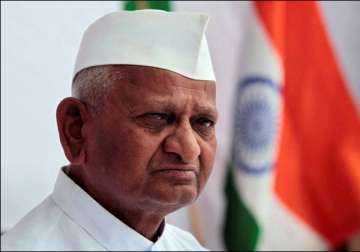Ralegan-Siddhi (Maharashtra), Sep 18: Unhappy with the manner in which the anti-corruption movement has been floundering for the past few months, its chief proponent Anna Hazare has decided to take some drastic steps to put it back on track, an official said here Monday.
For starters, Hazare has cast his net wider by inviting 35 top social workers from all over India for confabulations on how to strengthen and take forward the movement, the official said.
"On Tuesday, he will meet around half a dozen prominent social figures in Pune, followed by a similar meeting in New Delhi Wednesday," the aide, requesting anonymity told IANS.
At these meetings, Hazare is expected to make an appeal to these personalities - each renowned in their respective sphere - to either join or advise him on taking the anti-corruption crusade to its logical end.
Some of the prominent persons who have been invited include: Prakash Amte, Abhay Bang, Girish Prabhune, Suniti S.R., Medha Patkar, Vishwambhar Choudhary, Surekha Dalwi, Ulka Mahajan, Bhau Torsekar, Narendra Dabholkar, Jaywant Matkar and Avinash Dharmadhikari.
While many have responded positively to the invitation, a few others have cited prior commitments preventing them from attending Hazare's deliberations.
Hazare emphatically reiterated that he would not contest elections, nor form a political party - throwing cold water on a 'referendum' by India Against Corruption (IAC), the results of which were released this evening.
According to the IAC, its week-long survey attracted 737,041 respondents of whom 561,701 - 76 percent, favoured a political party, while the rest, 175,340 - 24 percent were opposed to a new political outfit.
